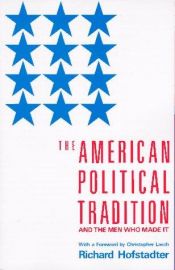The American Political Tradition : And the Men Who Made it
Blurb
The American Political Tradition is a 1948 book by Richard Hofstadter, an account on the ideology of previous U.S. presidents and other political figures. The full title is The American Political Tradition and the Men Who Made It.Hofstadter's introduction proposes that the major political traditions in the United States, despite contentious battles, have all
...shared a belief in the rights of property, the philosophy of economic individualism, the value of competition... [T]hey have accepted the economic virtues of a capitalist culture as necessary qualities of man.
While many accounts have made political conflict central,the author proposes that a common ideology of "self-help, free enterprise, competition, and beneficent cupidity" has guided the Republic since its inception. Through analyses of the ruling class in the U.S., Hofstadter argues that this consensus is the hallmark of political life in the U.S.
Part of Hofstadter's project is to undermine the democratic credentials of politicians mythologized by historians, calling for reflection rather than nostalgia.

 English
English Español
Español Deutsch
Deutsch










Member Reviews Write your own review
Nick.embrey
What the author describes as "a young man's book" is what reads today as a series of barely polemical character studies of a bunch of historically prominent American men. They're character studies not just in that the point of departure is biographical but so also is the point of return: Hofstadter brings to bear the historical context in the service of his judgment of these men's personalities and careers rather the judgment serving the history. What partially saves the banality of this approach is that it's easily and intelligently written (you can learn a lot about that historical context even though it's relegated to instrumentality) and that his judgments are entertainingly critical. There are very few of his men that he does not think are some combination of feckless, pompous, and stupid. In all, a tart and tangy example of the Great Men school that doesn't even approach transcending its genre.
Be the first person to review